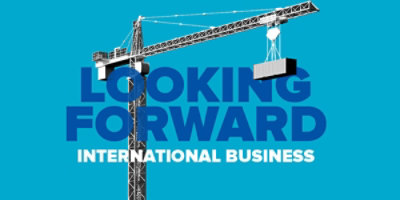-
Business Banking -
Looking Forward
The Effects of the Pandemic in Business: Changes That are Here to Stay
As the coronavirus pandemic shut down everyday commerce in 2020, businesses across the globe shifted focus, switching to remote work and in many cases offering new products, services and delivery methods to reach customers and maintain operations.
Now, as distribution of vaccines allows companies to consider their post-pandemic reality, many find themselves embracing or adapting to certain pivots that helped them through the crisis.
For instance, Norwegian company Playing Lean had always resisted requests to make an online version of its namesake board game, which coaches and consultants use to teach entrepreneurship, innovation and "lean startup" principles.
"Ever since the beginning we were adamant about keeping it a physical-first product," game creator Bruno Pešec said. "And then the pandemic happened. Educators still had to do their job, entrepreneurs still wanted to learn lean startup."
After experimenting for a few weeks, he said, the company created a remote version of Playing Lean that produced the same results.
"Our initial idea was to offer it only as long as the pandemic lasts and then decommission it. But we changed our mind when we noticed that we started to reach customers outside of our regular geographies. By moving Playing Lean online, we were suddenly seeing much more players and educators from the Americas and Africa," Pešec said.
How Do Companies Decide What Changes To Keep?
“I certainly think that those companies that benefited or created new product lines during 2020 aren't going to just shut them down," said David Cameron, head of business banking at City National Bank. "Maybe it's not the big opportunity today that it was through the pandemic but it's still going to be a nice complement to the business overall."
In office-oriented professional services sectors, Cameron expects hybrid working arrangements to become more common now that companies have pandemic-era experience with remote work and virtual meetings using platforms like Zoom and Microsoft Teams. Many companies now realize that employees may be more productive if they can avoid the daily commute and traffic grind at least part of the time, he noted.
"People are recognizing that a virtual meeting can be of value, yet they don't want to do it every single day, all day. So that's a new business practice that will allow companies to stay efficient, keep levels of engagement high and supplement face-to-face meetings that now don't need to happen as regularly," Cameron said. Professional services firms are unlikely to totally do away with in-person meetings and work, however.
“That will create more efficiencies for companies, it will mean operating expenses are lower and business travel will be lower," Cameron said. “That can be helpful to certain industries. But on the other side, there are businesses in the hospitality and other sectors that are negatively affected by reduced levels of business travel."
LinkedIn recently announced it would allow its more than 16,000 employees to work remotely full-time or to choose a hybrid arrangement.
"We trust each other to do our best work where it works best for us and our teams. We've learned every individual and every team works differently, so we're moving away from a one-size-fits-all policy. We're embracing flexibility with both hybrid and remote roles, expecting more of us to be remote than pre-Covid and removing the expectation of being in the office 50% of the time," LinkedIn CEO Ryan Roslansky wrote in a blog post, noting that most employees want to be in the office sometimes.
The pandemic prompted many businesses to adopt new technology to enable them to work better with employees and customers.
How Companies Adapted During COVID-19
The pandemic prompted many businesses to adopt new technology to enable them to work better with employees and customers.
The team at Home Grounds, a Westbury, NY-based online community for home coffee hobbyists, quickly realized that emails and shared documents weren't cutting it as hybrid and remote work became the norm during the pandemic, founder and CEO Alex Mastin said.
"As we're all naturally resistant to change we reluctantly incorporated some collaboration software into our daily business to establish a clear line of communication and reduce the errors occurring from botched email chains. Luckily, things like Slack and Monday.com made a huge difference and streamlined the workday by reducing emergency email reminders and pixelated [virtual] calls," he said.
After holding an employee poll, "it's safe to say we won't be going back as productivity and performance has never been at such a high despite the circumstances," Mastin said.
Moriarty's Gem Art, a jeweler that operates an Indiana store and e-commerce site, started producing educational and commercial livestreams for its local customers on YouTube and Facebook when the pandemic forced the physical shop to close from March through mid-June 2020.
"These live shows allow visitors to view our items, buy online and ask questions. We advertised our livestreams beforehand through emails, our website and social media followers. We are now getting about 1,000-plus viewers watching our show each month," said Jeff Moriarty, the firm's marketing manager.
"Not only has it helped to stay connected with our customers, it has generated a ton of sales — $20,000 from our last show — so that we are doing it once a month even now," he said.
As technology helped boost sales and opened new, distant markets for some companies, remote working arrangements sparked others to reach a wider labor pool.
The pandemic prompted Germany-based product management software firm airfocus to start hiring internationally, co-founder and CEO Malte Scholz said.
"We already had a pretty diverse team, but a lot of the employees were based in Germany or somewhere really close. That way, if we wanted to meet or have a team-building event, it was quite easy to organize. However, when most of the businesses switched to remote work, this opened a whole new international market for hiring talent," Scholz said.
"We decided to attract people from different continents and diversify our workforce even more. There were no signs of COVID disappearing any time soon so we figured we might as well use all of the benefits of a remote system. This was a great decision because our team is much more vibrant and incredibly motivated to work on further growing the company," he said.
Boston-based Testimonial Hero, a B2B video testimonial software firm, had a similar experience, going fully remote and achieving at least $1 million in revenue during the pandemic in 2020, CEO Sam Shepler said. The company plans to remain fully remote.
"I think one of the primary takeaways during the pandemic that we didn't anticipate is how well remote work would pan out for businesses. In our case, it worked wonders as all our employees became a lot more productive when they started working from home," Shepler said.
"It also forced us to hire new candidates over the internet, which allowed us to find some excellent international talent that we normally wouldn't have hired pre-pandemic. So the main pivot that we will definitely keep is to run the entire business 100% office-less since it's worked out well for us so far."
How Companies Changed Their Products During COVID-19
Some businesses are adapting their product lines to incorporate pandemic pivots longer term.
Los Angeles sign maker Front Signs decided to keep one of its new pandemic offerings and drop another.
The firm adjusted its production process during the pandemic to prioritize its regular products, such as safety signs, that were in high demand. They also introduced face shields and sneeze guards, CEO Gevorg Hambardzumyan said.
"These changes have had a subtle impact on our post-pandemic strategy. Although we ceased the production of face shields, we decided to keep producing sneeze guards as a useful and practical option for many businesses," he said.
"In offering sneeze guards as a means of virus protection, we found out that they serve various other functions as well. This is why we included them in our list of regular products even after the lockdown," Hambardzumyan explained.
"On the other hand, face shields are not very relevant to our business. We only offered them as a way to contribute to the public because we had the resources. Since there's not as much demand for them anymore, it doesn't make sense for us to carry on with the production."
Beyond sneeze guards, the nimble mindset that Front Signs called on during the pandemic will continue to play a role for the company, Hambardzumyan said.
"One thing is certain," he said. "The flexibility and resourcefulness we were forced to adopt during such a challenging time are pivots we'll gladly continue to develop as we move forward."
This article is for general information and education only. It is provided as a courtesy to the clients and friends of City National Bank (City National). City National does not warrant that it is accurate or complete. Opinions expressed and estimates or projections given are those of the authors or persons quoted as of the date of the article with no obligation to update or notify of inaccuracy or change. This article may not be reproduced, distributed or further published by any person without the written consent of City National. Please cite source when quoting.




